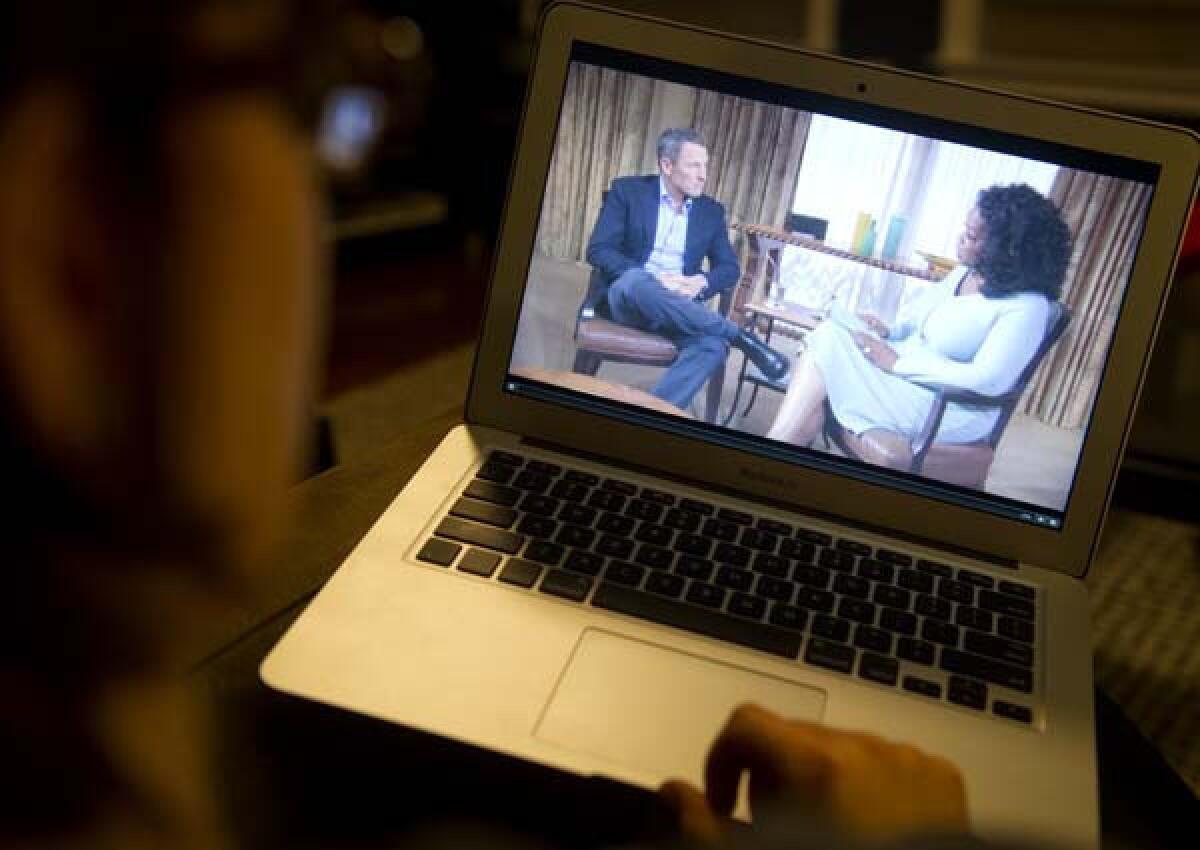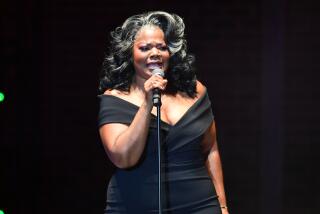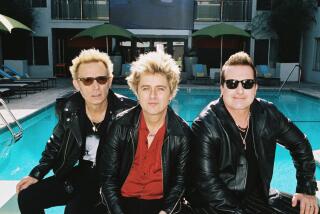Lance Armstrong admits drug use, bullying tactics

- Share via
Lance Armstrong calmly told Oprah Winfrey in a highly anticipated taped television interview Thursday night that he took a variety of performance-enhancing drugs while winning a record seven Tour de France titles, but that in his mind at the time, he didn’t consider it cheating.
At the start of a stunning question-and-answer exchange, the disgraced rider responded to a series of yes-or-no questions, answering affirmatively when asked whether he had taken specific drugs during a period when he was one of the most celebrated athletes in the world.
“The definition of cheating is to gain an advantage on a foe,” Armstrong later said, saying that the use of performance-enhancing drugs was part the culture of top-level cycling. “I viewed it as a level playing field.”
PHOTOS: Lance Armstrong through the years
“But you’re Lance Armstrong,” Winfrey said.
“I know, but hindsight is 20/20,” he said. “I didn’t know what I had.”
People “have every right to feel betrayed. It’s my fault. I will spend the rest of my life trying to earn back their trust.”
Armstrong, during the first half of a program that will be continued Friday night, acknowledged that he had been a bully to those who had accused him of cheating in the past, while at the same time claiming that he never forced other riders to use drugs or face being kicked off his team.
PHOTOS: Sports scandals, present and past
He said he regretted not cooperating with the United States Anti-Doping Agency when it was investigating him, but said the agency’s extensive characterization that Armstrong conducted “the most sophisticated, professionalized and successful doping program that sport has ever seen” was largely overstated.
The result of that investigation left him stripped of his Tour de France titles and banned from elite competition for the rest of his life.
Asked why he was coming forward after more than a decade of fierce denials of drug use, which included taking legal action against his accusers, Armstrong said, “I don’t know if I have a great answer for that.
“This is too late probably for most people, and that’s my fault.... I view the situation as one big lie I’ve repeated a lot of times.”
The 90-minute broadcast will be followed Friday with a second part on the Oprah Winfrey Network on Friday, the second installment of a 2 1/2-hour interview taped on Monday.
Armstrong opened the interview by saying “yes” to taking the banned energy boosting substance EPO, testosterone, HGH, cortisone and employing blood-doping practices and transfusions.
He said he started using in the “EPO generation” of the mid-1990s.
And he said that without using the performance-enhancing drugs, he would not have been able to win the seven Tour de France titles.
He also expressed regret at how he had “bullied” those who painted his success as fraudulent.
He sued his former masseuse, Emma O’Reilly, after she had revealed that he had wrongly backdated a prescription for banned cortisone after he tested positive for it in 1999.
“She’s one of those people I have to apologize to,” Armstrong said. “She got run over, got bullied. We sued so many people. I have reached out to her to make amends.”
Winfrey asked Armstrong why he has sued people when he knew they were telling the truth.
“It’s a major flaw,” he said. “A guy who wanted to control every outcome. To never forgive me, I understand that. I have started that process to speak to those people directly.”
Armstrong said he has reached out by telephone to Betsy Andreu, who said she and her husband Frankie, a former Armstrong teammate, first heard Armstrong admit to using testosterone and other performance-enhancing substances in a hospital room in 1996. They say he pressured Frankie Andreu to leave the U.S. Postal Service team after the 2000 Tour de France and negatively affected his career.
But Armstrong would not answer if the Andreus were telling the truth about what they say they had heard.
“I’m not going to take that one on,” Armstrong said. “I’m going to put that one down.”
Asked if his relationship with the Andreus is good, Armstrong said strongly, “No. They’ve been hurt too badly. A 40-minute conversation is not enough.”
“You called her crazy,” Winfrey said.
“I did,” Armstrong said.
“This was a guy who used to be my friend, who decimated me,” Andreu told CNN’s Anderson Cooper on Thursday night. “He could have come clean. He owed it to me. He owes it to the sport that he destroyed.”
Asked by Winfrey whether he was a bully, Armstrong said, “Yeah, yeah I am ... If I didn’t like what people said, I tried to control that.”
Winfrey noted the recent statement of USADA chief Travis Tygart that six samples taken from Armstrong after the 1999 Tour prologue came back in 2005 as positive for EPO, which wasn’t tested for in 1999.
“I didn’t fail a test,” Armstrong said. “I passed those others with nothing in my system.”
Armstrong also argued that a $100,000 donation to the International Cycling Union in 2005 was not intended to get the federation to turn its attention from another suspect result.
“It’s impossible to make anyone believe it,” he said, “it was not in exchange. They called and said they didn’t have a lot of money. I had money, was retired. I said, ‘Sure.’”
Winfrey was tough on Armstrong throughout, once showing a clip of the cyclist after his record seventh Tour win, in which he said, “To the cynics and skeptics, I’m sorry you can’t dream big and believe in miracles. You should believe in these people, and hard work wins it.”
Armstrong told Winfrey, “I’ve made some mistakes in my career and that was a mistake. That sounds ridiculous. I’m embarrassed.”
Yet, Armstrong would not acknowledge pressuring other riders to use drugs.
He rebutted the statement by former teammate Christian Vande Velde that Armstrong forced the lesser rider to use performance-enhancing substances to remain on the team.
Armstrong said Vande Velde’s statement in the massive USADA report that resulted in Armstrong’s being stripped of his titles and banned from competition for life was “not true.”
“There was a level of expectation; we expected guys to be fit, strong and perform,” Armstrong said. “I know I’m not the most believable guy in the world right now, but I didn’t do that.”
Pressed by Winfrey about his own use as the team leader, Armstrong said he “accepted” how Vande Velde could interpret it that way.
He said he learned growing up, “I will do everything I can to survive. I took it all into cycling, win at all costs. I wasn’t a bully” before cycling.
He said he would do anything to win.
Early in the interview, Armstrong said his story of returning from cancer to dominate the Tour de France was “perfect for so long.”
“Overcoming the disease, winning the Tour, the happy marriage … it was mythic, the perfect story.
“It wasn’t true. I’m a flawed character....
“Now this story is so bad and so toxic.”
He told Winfrey he didn’t “invent the culture” of doping in cycling, “but I didn’t try to stop the culture, and I’m sorry for that.”
He disputed the contention by Tygart that his was the “most sophisticated” doping system in sports history.
“It was definitely professional, definitely smart, but very conservative, risk-adverse. To say that it was bigger than the East German Olympic machine of the ‘70s and 80’s … .”
Armstrong said he viewed his doping as “simple,” using “things that were oxygen-boosting drugs that were incredibly beneficial for endurance sports. And that’s all you needed. My only cocktail was EPO, transfusions and testosterone, which I almost justified with my history of testicular cancer.”
Armstrong refused to accuse others of wrongdoing, though he said, if asked, he is open to helping USADA address cycling’s doping problems.
“I made my decisions,” he said. “I’m here to acknowledge that and say sorry for that.”
Lance.pugmire@latimes.com
Twitter.com/latimespugmire
More to Read
Go beyond the scoreboard
Get the latest on L.A.'s teams in the daily Sports Report newsletter.
You may occasionally receive promotional content from the Los Angeles Times.











